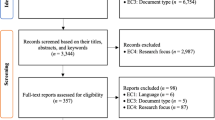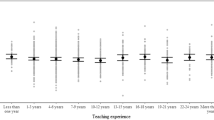Abstract
Within a global context of more standardization of teacher preparation, programs in the USA are increasingly using standardized teacher performance assessments such as edTPA to evaluate prospective teachers’ instructional effectiveness and readiness for their own classroom. This study was conducted in a state recently requiring successful completion of edTPA for initial teacher certification. Phenomenological methodology was used to examine the lived experiences of six elementary prospective teachers completing Elementary Education edTPA: Assessing Students’ Mathematics Learning (i.e., Math Task 4) during student teaching. Data were collected via 24 individual, phenomenological interviews at specific phases during the student teaching semester. Whole-Part-Whole analysis revealed the prospective teachers found themselves in a state of elusiveness as they engaged in Math Task 4. Three themes provide the structure for elusiveness, including juggling Math Task 4 in student teaching classrooms, from relying on experts to standing alone, and navigating edTPA processes. Understanding prospective teachers’ lived experiences with Math Task 4 provides insights into both needed supports for their successful completion of the task and some of the issues with a high stakes teacher performance assessment embedded in the student teaching semester.
Similar content being viewed by others
References
Adkins, A. (2016). The benefits of edTPA. Educational Leadership, 55–58.
American Association of Colleges for Teacher Education. (2019). How are states using edTPA for program approval and/or licensure? Retrieved from http://edTPA.aacte.org/state-policy
Au, W. (2013). What’s a nice test like you doing in a place like this? Rethinking Schools, 22–27.
Australian Institute for Teaching and School Leadership. (2020). Teaching performance assessment. Retrieved from https://www.aitsl.edu.au/deliver-ite-programs/teaching-performance-assessment
Ball, D. L., & Forzani, F. M. (2010). Teaching skillful teaching. Educational Leadership, 68(4), 40–45.
Behney, J. (2016). Perceived influence of cooperating teachers on edTPA performance. Foreign Language Annals, 49(2), 271–286.
Brown, A. L., Lee, J., & Collins, D. (2015). Does student teaching matter? Investigating pre-service teachers’ sense of efficacy and preparedness. Teaching Education, 26, 77–93.
Bunch, G. C., Aguirre, J. M., & Tellez, K. (2009). Beyond the scores: Using candidate responses on high stakes performance assessment to inform teacher preparation for English learners. Issues in Teacher Education, 18, 103–128.
Burns, B. A., Henry, J. J., & Lindauer, J. R. (2015). Working together to foster candidate success on the edTPA. Journal of Inquiry and Action in Education, 6(2), 18–37.
Carpenter, T. P., Fennema, E., Franke, M. L., Levi, L., & Empson, S. B. (2014). Children’s mathematics: Cognitively guided instruction. Portsmouth, NH: Heinemann and NCTM.
Cavanagh, M., Barr, J., Moloney, R., Lane, R., Hay, I., & Chu, H. (2019). Pre-service teachers’ impact on student learning: Planning, teaching, and assessing during professional practice. Australian Journal of Teacher Education, 44(2), 66–81.
Chandler-Olcott, K., & Fleming, S. (2017). Multiple perspectives on the state-mandated implementation of a high-stakes performance assessment for preservice English teacher candidates. Action in Teacher Education, 39, 22–38.
Chandler-Olcott, K., Fleming, S. M., & Nieroda, J. L. (2016). “Perhaps these are not poetic times at all”: Using poetry to cope with and critique a high-stakes teacher performance assessment. English Education, 48(3), 237–266.
Chung, R. R. (2008). Beyond assessment: Performance assessments in teacher education. Teacher Education Quarterly, 35, 7–28.
Clayton, C. D. (2018). Policy meets practice in New York state: Understanding early edTPA implementation through preservice candidates’ eyes. Teacher Education Quarterly, 97–125.
Cochran-Smith, M., Stern, R., Sánchez, J. G., Miller, A., Keefe, E. S., Fernández, M. B., Chang, W., Carney, M. C., Burton, S., & Baker, M. (2016). Holding teacher preparation accountable: A review of claims and evidence. Boulder, CO: National Education Policy Center. Retrieved October 7, 2016 from http://nepc.colorado.edu/publication/teacher-prep.
Dahlberg, K., Dahlberg, H., & Nystrom, M. (2008). Reflective lifeworld research. Lund, Sweden: Studentlitteratur AB.
Darling-Hammond, L. (2017). Teacher education around the world: What can be learn from international practice? European Journal of Teacher Education, 40, 291–309.
Darling-Hammond, L., & Hyler, M. E. (2013). The role of performance assessment in developing teaching as a profession. Rethinking Schools, 10–15.
Denton, D. W. (2013). Responding to edTPA: Transforming practice or applying shortcuts? AILCATE Journal, 10(1), 19–36.
Dover, A. G., & Schultz, B. D. (2016). Troubling the edTPA: Illusions of objectivity and rigor. The Educational Forum, 80, 95–106.
Dwyer, R., Willis, A., & Call, K. (2020). Teacher educators speaking up: Illuminating stories stifled by the iron-grip regulation of initial teacher education. Asia-Pacific Journal of Teacher Education. Advance online publication.
Gallant, A., & Mayer, D. (2012). Teacher performance assessment in teacher education: An example in Malaysia. Journal of Education for Teaching, 38, 295–307.
Gitomer, D. H., Martinez, J. F., Battey, D., & Hyland, N. E. (2020). Assessing the assessment: Evidence of reliability and validity in the edTPA. American Educational Research Journal. Advance online publication.
Greenblatt, D. (2015). TPA–taking power away. Education in a Democracy, 7, 103–134.
Greenblatt, D., & O’Hara, K. E. (2015). Buyer beware: Lessons learned from edTPA implementation in New York state. Thought and Action, 57–67.
Heil, L., & Berg, M. H. (2017). Something happened on the way to completing the edTPA: A case study of teacher candidates’ perceptions of the edTPA. Contributions to Music Education, 42, 181–199.
Huston, T. (2016). edTPA, videotape, and occupational identity: A study of pre-service teachers. Teaching Education, 28(2), 194–210.
Hutt, E. L., Gottlieb, J., & Cohen, J. J. (2018). Diffusion in a vacuum: edTPA, legitimacy, and the rhetoric of teacher professionalization. Teaching and Teacher Education, 69, 52–61.
Jacobs, T., Smith, M. E., Swars Auslander, S., Smith, S. Z., & Myers, K. (2017). Building synergy: Cognitively Guided Instruction and implementation of a simulated edTPA elementary mathematics task during an undergraduate methods course. Mathematics Teacher Educator, 6, 40–51.
Kissau, S., Hart, L. C., & Algozzine, B. (2017). Investigating the impact of edTPA professional development on classroom practice and student teaching experience. Journal of Teacher Education. Advance online publication.
Ledwell, K., & Oyler, C. (2016). Unstandardized responses to a “standardized” test: The edTPA as gatekeeper and curriculum change agent. Journal of Teacher Education, 67(2), 120–134.
Lerman, S. (2014). Mapping the effects of policy on mathematics teacher education. Educational Studies in Mathematics, 87(2), 187–201.
Madeloni, B., & Gorlewski, J. (2013). Wrong answer to the wrong question. Rethinking Schools, 16–21.
Merrian-Webster. (2019). Retrieved from https://www.merriam-webster.com/
Meuwissen, K. W., & Choppin, J. M. (2015). Preservice teachers’ adaptations to tensions associated with the edTPA during its early implementation in New York and Washington states. Education Policy Analysis Archives, 23(103), 1–25.
Mills, M., & Goos, M. (2017a). The place of research in teacher education? An analysis of the Australian Teacher Education Ministerial Advisory Group report Action Now: Classroom Ready Teachers. In M. Peters, B. Cowie, & I. Menter (Eds.), A companion to research in teacher education (pp. 637–650). Singapore: Springer.
Mills, M., & Goos, M. (2017b). Three major concerns with teacher education reforms in Australia [Web log post]. Retrieved from: https://www.aare.edu.au/blog/?p=2548
National Center on Education and the Economy. (2020). Shanghai-China: Teacher and principal quality. Retrieved from: http://ncee.org/what-we-do/center-on-international-education-benchmarking/top-performing-countries/shanghai-china/shanghai-china-teacher-and-principal-quality/
National Council of Teachers of Mathematics. (2000). Principles and standards for school mathematics. Reston, VA: Author.
National Council of Teachers of Mathematics. (2014). Principles to actions: Ensuring mathematical success for all. Reston, VA: Author.
National Governors Association Center for Best Practices & Council of Chief State School Officers. (2010). Common core state standards for mathematics. Washington, DC: Authors.
Paugh, P., Wendell, K. B., Power, C., & Gilbert, M. (2018). “It’s not that easy to solve”: edTPA and preservice teacher learning. Teaching Education, 29(2), 147–164.
Pecheone, R. L., & Whittaker, A. (2016). Well-prepared teachers inspire student learning. Phi Delta Kappan, 97(7), 8–13.
Santagata, R., & Sandholtz, J. H. (2018). Preservice teachers’ mathematics teaching competence: Comparing performance on two measures. Journal of Teacher Education. Advance online publication.
Seymour, C. A., Burns, B. A., & Henry, J. J. (2018). Cooperating teachers stakeholders in the edTPA? Issues in Teacher Education, 27, 41–56.
Smith, M. S., & Stein, M. K. (2011). Five practices for orchestrating productive mathematics discussions. Reston, VA: Corwin and NCTM.
Soslau, E., & Raths, J. (2017). Problems in student teaching. Journal of Teaching and Learning, 11, 20–28.
Stacey, M., Talbot, D., Buchanan, J., & Mayer, D. (2019). The development of an Australian teacher performance assessment: Lessons from the international literature. Asia-Pacific Journal of Teacher Education. Advance online publication.
Stanford Center for Assessment, Learning, and Equity. (2015). edTPA elementary education assessment handbook. Retrieved from http://education.ucsc.edu/academics/mac-info/edTPAelehandbook.pdf
Stanford Center for Assessment, Learning, and Equity. (2016). Understanding rubric level progressions. Retrieved from https://secure.aacte.org/apps/rl/resource.php?resid=469&ref=edtpa
Swars Auslander, S., Smith, S. Z., Smith, M. E., & Myers, K. (2020). A case study of elementary teacher candidates’ preparation for a high stakes teacher performance assessment. Journal of Mathematics Teacher Education, 23, 269–291.
Vagle, M. D. (2014). Crafting phenomenological research. Walnut Creek, CA: Left Coast Press.
van Manen, M. (1990). Researching lived experiences. Albany, NY: State University of New York Press.
van Manen, M. (2014). Phenomenology of practice. Walnut Creek, CA: Left Coast Press.
Author information
Authors and Affiliations
Corresponding author
Additional information
Publisher's Note
Springer Nature remains neutral with regard to jurisdictional claims in published maps and institutional affiliations.
Rights and permissions
About this article
Cite this article
Jacobs, T., Swars Auslander, S. Understanding a high stakes teacher performance assessment in mathematics through elementary prospective teachers’ lived experiences. J Math Teacher Educ 24, 459–480 (2021). https://doi.org/10.1007/s10857-020-09467-z
Published:
Issue Date:
DOI: https://doi.org/10.1007/s10857-020-09467-z




